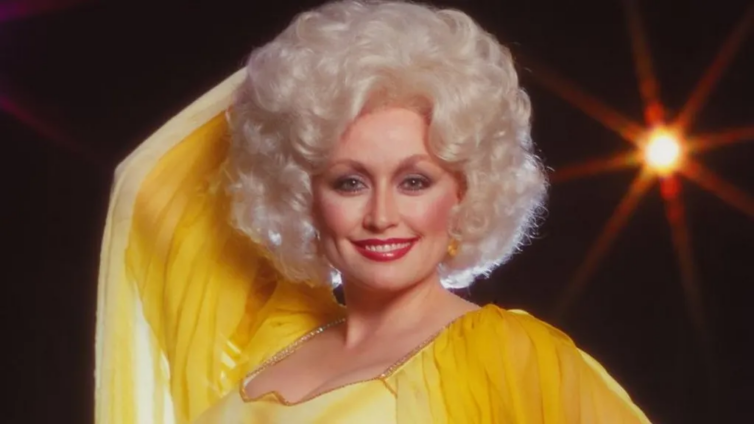Are you having a productive day? Perhaps consider Dolly Parton and think again.
One afternoon in 1973, a flash of inspiration saw her sit down and write two classics back to back.
First came Jolene - a career-defining smash, synonymous with Parton alone. The next? I Will Always Love You.
Not a bad nine-to-five.
That tender second track, released 50 years ago this week, remains one of her lesser-known credits, despite soundtracking love and heartbreak for half a century. It was Whitney Houston's cover version, recorded for the soundtrack of The Bodyguard in 1992, that elevated the song to classic status.
A response to Parton's Instagram post celebrating the anniversary of "her song" made the public's confusion clear.
"It will always hold a special place in my heart as I hope it does yours," Parton wrote on Tuesday, only for one of the top-rated replies to confess: "I never realised it was your song."
So, after five decades of loving declarations (reciprocated or otherwise), we look at I Will Always Love You's eventful past - from Elvis Presley's failed attempt to poach the song, to the surprising way Parton spent her royalties. What a way to make a living.
Cold-blooded beginnings
The sweetness of Dolly Parton's original version belies the independent, lone-wolf mindset that created it.
Having moved to Nashville from east Tennessee after leaving school in 1964, Parton found only middling success as a singer-songwriter before catching the eye of singer Bill Phillips, who duetted on her song Put it Off Until Tomorrow.
Country star Porter Wagoner then invited Parton to be the "girl singer" on his TV show - eventually signing her to his label and giving her the big break she craved.
Parton's first single on that label, a cover of Tom Paxton's The Last Thing on My Mind, was a duet with Wagoner. When it made the country top 10 in 1968, it sparked the beginning of a formidable musical partnership.
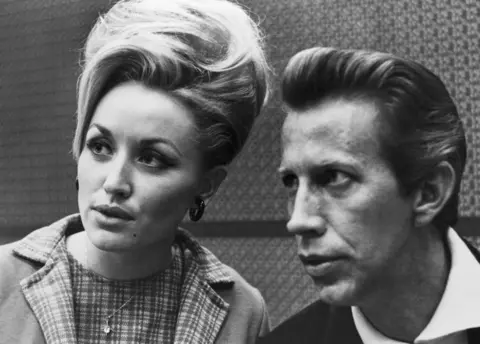 Parton's gratitude to Port Wagoner, pictured together in 1968, inspired her to write I Will Always Love You
Parton's gratitude to Port Wagoner, pictured together in 1968, inspired her to write I Will Always Love You
Getty Images
But by 1973, Parton wanted to make the stage and TV screens hers alone. "I had come to Nashville to be my own star," she told DJ Howard Stern in 2023.
"I really felt like I needed to move on. I didn't want to spend the rest of my life being a girl singer. I knew my destiny. I knew that I had to continue doing what I felt... drawn to do."
Making her mind up was one thing, breaking the news to Wagoner another.
Recalling the agony of conflicted emotions, she said: "How am I going to make him understand how much I appreciate everything, but that I have to go?
"I thought, well, what do you do best? You write songs. So I sat down and I wrote this song."
And so Parton's I Will Always Love You - an ode of heartfelt thanks beset with steely defiance - was born.
The next morning, she strode into Wagoner's office and told him to sit down. "I sang the song alone in his office - just me and my guitar," she told Stern.
Tears rolled down his face from behind the desk. "That's the best song you've ever wrote," he told her. "You can go if I can produce the song."

GETTY IMAGES
Marc Lee, who wrote about the song for the Financial Times' Life of a Song column, told the BBC it endures as "an extraordinarily heart-rending blend of silky fragility and searing intensity".
He added: "It's remarkable because it announces the painful end of a relationship at the same time as declaring that here is an emotional bond that will endure forever."
Breaking Elvis' heart
Fast forward a year, and Parton's two songs from that rich-veined writing session had both become number one country singles in the US, and she was beginning to make inroads with the mainstream pop audience.
Then Elvis called - he had heard I Will Always Love You and wanted to record a cover.
"You cannot imagine how excited I am about this," she told him. "This is the greatest thing that's ever happened to me as a songwriter."
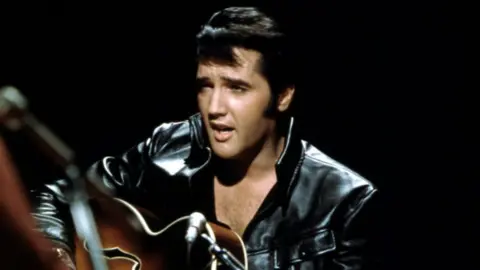 Elvis' heartfelt ballads suggest his voice could have added something special to I Will Always Love You
Elvis' heartfelt ballads suggest his voice could have added something special to I Will Always Love You
GETTY IMAGES
But the night before the recording session, his notoriously tough manager, Colonel Tom Parker, called Parton and told her Presley wouldn't record the song unless she handed over half of the songwriting rights.
Displaying the same hard-nosed business savvy that saw her walk away from Wagoner to find solo success, Parton forced herself to say no.
"I said, 'I can't do that'," she told Stern. "Of course I cried all night about that."
Silver screen goldrush
For all that Parton has, understandably, been tormented by intrigue over what Presley's lovelorn stardust could have created, her instinct to hold firm quite literally paid dividends.
In 1975, shortly after Parton originally released I Will Always Love You, Lawrence Kasdan penned the screenplay for The Bodyguard, a romance that sees an ex-Secret Service agent fall for the pop star he's been hired to protect.
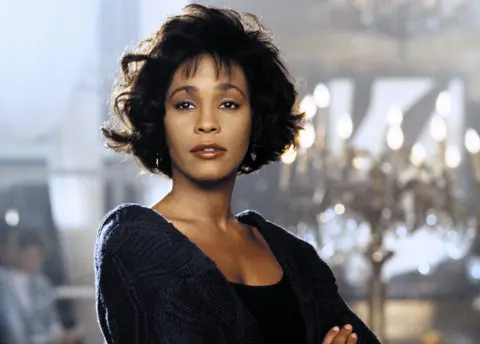 Whitney Houston played pop star Rachel Marron in The Bodyguard
Whitney Houston played pop star Rachel Marron in The Bodyguard
Alamy
It took 17 years for the stars to align and for Kevin Costner and Whitney Houston, a real-life pop megastar, to bring the story to the big screen in 1992 - with I Will Always Love You in its soundtrack.
It was Costner, according to Stereogum's The Number Ones column, who suggested Houston sing a country song.
Scepticism reigned, but a tape was made of potential tunes, including Linda Ronstadt's 1975 cover of Parton's humble ballad. Producer David Foster reworked it into a brooding, ultimately climactic tour de force that let Houston's voice run riot.
"Parton's recording has an understated purity and authenticity that's irresistible. Houston's version is similarly affecting but delivered on a vastly different scale," Lee tells the BBC.
Its a capella opening, again included on Costner's suggestion to better fit the film, builds to Houston's lung-busting final verse and note.
"She transforms what Dolly described as 'a simple song about everything and nothing' into a monumental power ballad that summons all the energy of a plane taking off," says Lee.
Parton similarly felt the whirlwind, telling Stern she unexpectedly heard the cover when driving home in her Cadillac, and was so overwhelmed she had to pull over because she "almost wrecked" the car.
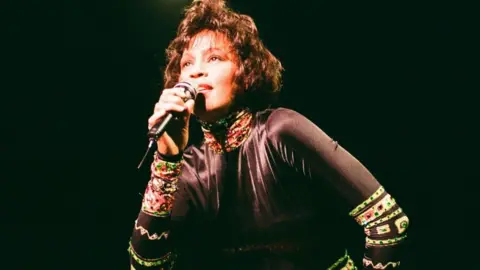 Houston in concert in 1993 as part of The Bodyguard world tour (GETTY IMAGES)
Houston in concert in 1993 as part of The Bodyguard world tour (GETTY IMAGES)
"I was like a dog hearing a whistle... It was ringing some sort of bell... By the time I realised that she was ready to go into the chorus... I couldn't believe my little country sad song could even be done like that.
"That was one of the greatest experiences I've ever had in my entire life."
The rest, as they say, is history.
Houston's version became a mammoth hit worldwide, spending 10 weeks at number one in the UK, where it was the biggest-selling single of the year, and 14 weeks atop the US Billboard charts. It proved so successful that it eventually won record of the year at the 1994 Grammy Awards.
It proved so successful that it eventually won record of the year at the 1994 Grammy Awards.

With global sales topping 20 million, the song reportedly earned Parton more than $10m (£7m) in royalties from Houston's cover in the 1990s alone.
In 2021, she told chat show host Andy Cohen she had invested some of the money in a black neighbourhood in Nashville as a tribute to Houston, who died at the age of 48 in 2012.
"It was mostly just black families and people that lived around there," Parton said. "It was a whole strip mall. And I thought, 'This is the perfect place for me to be, considering it was Whitney'."
The cultural prominence of the song continues to this day, with a theatre performance of The Bodyguard cut short last year due to one audience member singing along too loudly.
As for Presley, Parton says she's since made enough money from all iterations of the song combined to be able to afford to buy his famous Graceland property multiple times over.
And in an effort to solve the mystery of his 'lost' cover, Lee says: "I imagine he would have treated it respectfully, layering it with the kind of subtlety and vocal restraint he brought to his covers of songs like Can't Help Falling in Love and Unchained Melody."
Fan versions, made through AI, (sort of) reach the same conclusion.
All that's left is for you to take a deep breath, turn up the volume on the chorus and, well, you know the rest. It would be rude not to. For Parton, Presley and Houston.
Latest Stories
-
ShoreCare: KNUST students organise clean-up exercise at Allan and African beaches
1 hour -
Ejisu by-election was an election of inducement – Hopeson Adorye
1 hour -
Air Quality: World Bank unveils $1 billion guarantee to bolster clean air projects globally
1 hour -
Dumsor Diaries: The struggle of tailors and seamstresses to make ends meet
2 hours -
Chiefs standing to greet the president at public events is apt – Chieftaincy Minister
2 hours -
60 farmers in Kumasi receive training on traditional leafy vegetables
2 hours -
MP who allegedly bribed EC agents must be arrested – Mustapha Gbande
3 hours -
NPP’s Kwabena Boateng leading in Ejisu by-election
4 hours -
Dominic Obour: Beware of rented media and socio-political liars
4 hours -
Partnership launched to provide pensions for small-scale farmers
4 hours -
Ejisu by-election: Why would I bribe election officials in public? – asks Kingsley Nyarko
5 hours -
Vinicius scores twice as Real Madrid draw against Bayern in Germany
5 hours -
I’m doing well – Amerado assures fans after stage mishap
6 hours -
EC asks police to start criminal investigation into Ejisu by-election ‘white envelope’ bribery allegation
7 hours -
LPG Marketers Association kicks against NPA’s $80 per metric ton levy on LPG
8 hours

